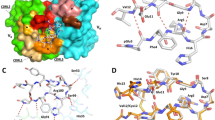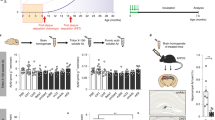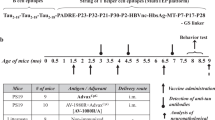Abstract
One of the most clinically advanced forms of experimental disease-modifying treatment for Alzheimer disease is immunization against the amyloid β protein (Aβ)1,2,3,4,5,6,7, but how this may prevent cognitive impairment is unclear8,9,10,11,12,13. We hypothesized that antibodies to Aβ could exert a beneficial action by directly neutralizing potentially synaptotoxic soluble Aβ species14,15,16 in the brain. Intracerebroventricular injection of naturally secreted human Aβ inhibited long-term potentiation (LTP), a correlate of learning and memory17, in rat hippocampus in vivo but a monoclonal antibody to Aβ completely prevented the inhibition of LTP when injected after Aβ. Size fractionation showed that Aβ oligomers, not monomers or fibrils, were responsible for inhibiting LTP, and an Aβ antibody again prevented such inhibition. Active immunization against Aβ was partially effective, and the effects correlated positively with levels of antibodies to Aβ oligomers. The ability of exogenous and endogenous antibodies to rapidly neutralize soluble Aβ oligomers that disrupt synaptic plasticity in vivo suggests that treatment with such antibodies might show reversible cognitive deficits in early Alzheimer disease.
This is a preview of subscription content, access via your institution
Access options
Subscribe to this journal
Receive 12 print issues and online access
$209.00 per year
only $17.42 per issue
Buy this article
- Purchase on Springer Link
- Instant access to full article PDF
Prices may be subject to local taxes which are calculated during checkout




Similar content being viewed by others
References
Nicoll, J.A.R. et al. Neuropathology of human Alzheimer disease after immunization with amyloid-β peptide: a case report. Nat. Med. 9, 448–452 (2003).
Hock, C. et al. Antibodies against β-amyloid slow cognitive decline in Alzheimer's disease. Neuron 38, 547–554 (2003).
McGeer, P.L. & McGeer, E. Is there a future for vaccination as a treatment for Alzheimer's disease? Neurobiol. Aging 24, 391–395 (2003).
Orgogozo, J.M. et al. Subacute meningoencephalitis in a subset of patients with AD after Aβ42 immunization. Neurology 61, 46–54 (2003).
Nicoll, J.A.R. et al. Specificity of mechanisms for plaque removal after Aβ immunotherapy for Alzheimer disease – Reply. Nat. Med. 10, 118–119 (2004).
Schenk, D., Hagen, M. & Seubert, P. Current progress in β-amyloid immunotherapy. Curr. Opin. Immunol. 16, 599–606 (2004).
Robinson, S., Bishop, G., Lee, H. & Munch, G. Lessons from the AN 1792 Alzheimer vaccine: lest we forget. Neurobiol. Aging, 609–615 (2004).
Bard, F. et al. Peripherally administered antibodies against amyloid β-peptide enter the central nervous system and reduce pathology in a mouse model of Alzheimer disease. Nat. Med. 6, 916–919 (2000).
DeMattos, R.B. et al. Peripheral anti-Aβ antibody alters CNS and plasma Aβ clearance and decreases brain Aβ burden in a mouse model of Alzheimer's disease. Proc. Natl. Acad. Sci. U.S.A. 98, 8850–8855 (2001).
Bacskai, B.J. et al. Imaging of amyloid-β deposits in brains of living mice permits direct observation of clearance of plaques with immunotherapy. Nat. Med. 7, 369–372 (2001).
Dodart, J.C. et al. Immunization reverses memory deficits without reducing brain Aβ burden in Alzheimer's disease model. Nat. Neurosci. 5, 452–457 (2002).
Kotilinek, L.A. et al. Reversible memory loss in a mouse transgenic model of Alzheimer's disease. J. Neurosci. 22, 6331–6335 (2002).
Wilcock, D.M. et al. Microglial activation facilitates Aβ plaque removal following intracranial anti-Aβ antibody administration. Neurobiol. Dis. 15, 11–20 (2004).
Lue, L.F. et al. Soluble amyloid β peptide concentration as a predictor of synaptic change in Alzheimer's disease. Am. J. Pathol. 155, 853–862 (1999).
McLean, C.A. et al. Soluble pool of Aβ amyloid as a determinant of severity of neurodegeneration in Alzheimer's disease. Ann. Neurol. 46, 860–866 (1999).
Wang, J., Dickson, D.W., Trojanowski, J.Q. & Lee, V.M. The levels of soluble versus insoluble brain Aβ distinguish Alzheimer's disease from normal and pathologic aging. Exp. Neurol. 158, 328–37 (1999).
Morris, R.G.M. et al. Elements of a neurobiological theory of the hippocampus: the role of activity-dependent synaptic plasticity in memory. Philos. Trans. R. Soc. Lond. B Biol. Sci. 358, 773–786 (2003).
Walsh, D.M. et al. Naturally secreted oligomers of amyloid β protein potently inhibit hippocampal long-term potentiation in vivo. Nature 416, 535–539 (2002).
Kim, K.S. et al. Production and characterization of monoclonal antibodies reactive to synthetic cerebrovascular amyloid peptide. Neurosci. Res. Commun. 2, 121–130 (1988).
Walsh, D.M., Tseng, B.P., Rydel, R.E., Podlisny, M.B. & Selkoe, D.J. The oligomerization of amyloid β-protein begins intracellularly in cells derived from human brain. Biochemistry 39, 10831–10839 (2000).
Gong, Y.S. et al. Alzheimer's disease-affected brain: Presence of oligomeric Aβ ligands (ADDLs) suggests a molecular basis for reversible memory loss. Proc. Natl. Acad. Sci. USA 100, 10417–10422 (2003).
Wang, Q.W., Walsh, D.M., Rowan, M.J., Selkoe, D.J. & Anwyl, R. Block of long-term potentiation by naturally secreted and synthetic amyloid β-peptide in hippocampal slices is mediated via activation of the kinases c-Jun N-terminal kinase, cyclin-dependent kinase 5, and p38 mitogen-activated protein kinase as well as metabotropic glutamate receptor type 5. J. Neurosci. 24, 3370–3378 (2004).
Chauhan, M., Siegel, G. & Lichtor, T. Distribution of intraventricularly administered antiamyloid-β peptide (Aβ) antibody in the mouse brain. J. Neurosci. Res. 66, 231–235 (2001).
Schenk, D. et al. Immunization with amyloid-β attenuates Alzheimer disease-like pathology in the PDAPP mouse. Nature 400, 173–177 (1999).
Xia, W. et al. Presenilin 1 regulates the processing of β-amyloid precursor protein C-terminal fragments and the generation of amyloid β-protein in endoplasmic reticulum and Golgi. Biochemistry 37, 16465–16471 (1998).
Walsh, D.M. et al. Certain inhibitors of synthetic Aβ fibrillogenesis block oligomerization of natural Aβ and thereby rescue long term potentiation. J. Neurosci. 25, 2455–2462 (2005).
Walsh, D.M., Lomakin, A., Benedek, G.B., Condron, M.M. & Teplow, D.B. Amyloid β-protein fibrillogenesis. Detection of a protofibrillar intermediate. J. Biol. Chem. 272, 22364–22372 (1997).
Walsh, D. et al. Amyloid β-protein fibrillogenesis: structure and biological activity of protofibrillar intermediates. J. Biol. Chem. 274, 25945–25952 (1999).
Lemere, C., Spooner, E., Leverone, J., Mori, C. & Clements, J. Intranasal immunotherapy for the treatment of Alzheimer's disease: Escherichia coli LT and LT(R192G) as mucosal adjuvants. Neurobiol. Aging 23, 991–1000 (2002).
Lemere, C. et al. Sequence of deposition of heterogeneous amyloid-β peptides and Apo E in Down syndrome: implications for initial events in amyloid plaque formation. Neurobiol. Dis. 3, 16–32 (1996).
Acknowledgements
This research was funded by Science Foundation Ireland (M.R. and R.A.), the Health Research Board of Ireland (M.R. and R.A.), Enterprise Ireland (M.R. and R.A.), the Irish Higher Education Authority (Programme for Research in Third Level Institutions) (M.R. and R.A.), the Wellcome Trust (M.R., R.A. and D.W.), the US National Institutes of Health (grant number AG06173 to D.S.) and the Foundation for Neurologic Diseases (C.L. and D.S.).
Author information
Authors and Affiliations
Corresponding authors
Ethics declarations
Competing interests
Dennis J. Selkoe is a consultant to Elan, plc.
Supplementary information
Supplementary Table 1
Isotope analysis (PDF 24 kb)
Rights and permissions
About this article
Cite this article
Klyubin, I., Walsh, D., Lemere, C. et al. Amyloid β protein immunotherapy neutralizes Aβ oligomers that disrupt synaptic plasticity in vivo. Nat Med 11, 556–561 (2005). https://doi.org/10.1038/nm1234
Received:
Accepted:
Published:
Issue Date:
DOI: https://doi.org/10.1038/nm1234
This article is cited by
-
The synapse as a treatment avenue for Alzheimer’s Disease
Molecular Psychiatry (2022)
-
Amyloid-β oligomers in the nucleus accumbens decrease motivation via insertion of calcium-permeable AMPA receptors
Molecular Psychiatry (2022)
-
Inhibition of Rac1-dependent forgetting alleviates memory deficits in animal models of Alzheimer’s disease
Protein & Cell (2019)
-
Decoding the synaptic dysfunction of bioactive human AD brain soluble Aβ to inspire novel therapeutic avenues for Alzheimer’s disease
Acta Neuropathologica Communications (2018)
-
Diffusible, highly bioactive oligomers represent a critical minority of soluble Aβ in Alzheimer’s disease brain
Acta Neuropathologica (2018)



